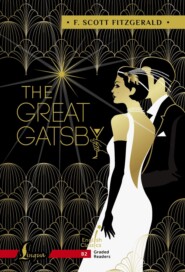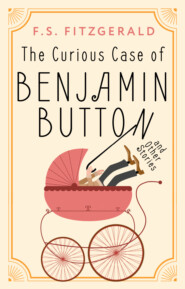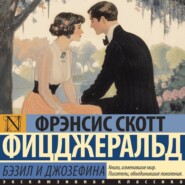По всем вопросам обращайтесь на: info@litportal.ru
(©) 2003-2025.
✖
The Curious Case of Benjamin Button and Selected Tales of the Jazz Age Сollection. Адаптированная книга для чтения на английском языке. Уровень B1
Настройки чтения
Размер шрифта
Высота строк
Поля
When his son was dressed Mr. Button examined him with depression. The costume consisted of pink pants and a blouse with a wide white collar. The long gray beard fell almost to the waist. The effect was not good.
«Wait!»
Mr. Button took hospital scissors and cut a large section of the beard. But even with this improvement the impression was far from perfect. The remaining part of the beard, the pale eyes, and the ancient teeth seemed strange in combination with the bright colors of the costume. Mr. Button, however, refused to change his plan – he held out his hand and said firmly. «Come along!»
His son took the hand. «What are you going to call me, dad?» he asked in a trembling voice as they walked from the hospital – «just ‘baby' for a while? till you think of a better name?»
«I don't know», grumbled Mr. Button. «I think we'll call you Methuselah[16 - Methuselah – (библ.) Мафусаил, согласно Библии один из праотцов человечества, проживший 969 лет, имя используется как синоним долгожителя, древнего старика]».
Chapter 3
Even after a baby had his hair cut short and then dyed to an unnatural black, and had his face shaved, and then was dressed in small-boy clothes, it was impossible for Button to ignore the fact that his son was a shame for the Button family. Despite his aged stoop, Benjamin Button – for they called him this name instead of the proper but humiliating name Methuselah – was five feet eight inches[17 - five feet eight inches – 5 футов 8 дюймов, 172 см] tall. His clothes did not hide this, his dyed black eyebrows did not hide the fact that the eyes were pale and tired. In fact, the baby-sitter, who was employed by the family, left the house after one look at him, in a state of indignation.
But Mr. Button was firm in his decision. Benjamin was a baby, and he should remain a baby. At first he declared that if Benjamin didn't like warm milk he could do without[18 - do without – (фраз. гл., разг.) обходиться без] food at all, but he finally allowed his son to have bread and butter, and even oatmeal as a compromise. One day he brought home a rattle[19 - rattle – детская погремушка] and, giving it to Benjamin, insisted that he should «play with it», so the old man obeyed and took it with a dull expression. He shook the rattle from time to time[20 - from time to time – (идиом.) время от времени; от случая к случаю] during the day.
There was no doubt, however, that the rattle bored him, and that he found other and more pleasant amusements when he was left alone. Mr. Button discovered one day that during the last week he had smoked more cigars than ever before – a phenomenon, which was explained a few days later when he entered his son's room and found it full of faint smoke. Benjamin, with a guilty expression on his face, was trying to hide the dark Havana cigar. Mr. Button, of course, had to spank the child, but he found that he could not make himself do it. He only said to his son that smoking would «stop his growth».
Mr. Button was still firm in his attitude. He brought home lead soldiers, he brought toy trains, he brought large pleasant animals made of cotton, and, to keep the illusion which he was creating – for himself at least – he passionately asked the clerk in the toy-store whether «the paint would come off the pink duck if the baby put it in his mouth». But, despite all his father's efforts, Benjamin refused to be interested. He often went down the back stairs secretly and returned to his room with a volume of the Encyclopedia Britannica, which he could read through an afternoon, ignoring his cotton cows and his Noah's ark[21 - Noah's ark – (библ.) Ноев ковчег, судно, построенное Ноем для спасения от Всемирного потопа своей семьи, а также всех животных (по паре особей каждого вида)], which were left on the floor. Mr. Button's efforts were useless against such stubbornness.
The sensation created in Baltimore was, at first, enormous. No-one can say what the misfortune it would cost the Button family socially, but the sudden start of the Civil War[22 - Civil War – Гражданская война в США 1861–1865 гг. между промышленными штатами Севера и рабовладельческими штатами Юга] drew the city's attention to other things. A few people, who were always polite, tried their best to think of compliments for the parents – and finally decided to declare that the baby looked like his grandfather, a fact which seemed true, due to the state of decay typical for all men of seventy. Mr. and Mrs. Roger Button were not pleased, and Benjamin's grandfather was extremely insulted.
Benjamin, after he left the hospital, took life as it was, without complaining. Once several small boys were brought to see him, and he spent a dull afternoon trying to show an interest in toys and games – he even managed to break a kitchen window with a stone, an incident which secretly delighted his father.
Since then Benjamin tried to break something every day, but he did these things only because he wanted to please his father and because he was by nature helpful.
When his grandfather's original dislike went away, Benjamin and that gentleman took enormous pleasure in one another's company. They could sit for hours, so different in age and experience, and, like old friends, discuss the slow events of the day. Benjamin felt much easier in his grandfather's company than in his parents' – they seemed always slightly afraid of him and often addressed him as «Mr».
He was puzzled himself at the age of his mind and body at birth. He read the medical journals, but found that no such case had ever been written about. Following his father's strong wish he made an honest attempt to play with other boys, but he often joined in the quiet games – football frightened him too much, because he feared that in case of a fracture his ancient bones would never knit[23 - in case of a fracture his ancient bones would never knit – при переломе его старческие кости никогда не срастутся].
When he was five he was sent to kindergarten, where he learned a secret of the art of placing green paper on orange paper, and making colored maps. He sometimes fell to sleep in the middle of these tasks, a habit which both irritated and frightened his young teacher. To his relief she complained to his parents, and they took him from the school. The Buttons told their friends that they felt he was too young.
By the time he was twelve years old his parents had got used to him[24 - his parents had got used to him – родители наконец к нему привыкли]. Indeed, the force of habit is so strong that they no longer felt that he was different from any other child – except when some curious event reminded them of the fact. But one day a few weeks after his twelfth birthday, while looking in the mirror, Benjamin made, or thought he made, an astonishing discovery. Did his hair turn darker? Were the wrinkles on his face becoming less obvious? Was his skin healthier and firmer, with even a touch of pink winter color? He could not tell. He knew that he no longer stooped, and that his physical condition had improved since the early days of his life.
«Can it be…?» he thought to himself.
He went to his father. «I am grown», he announced firmly. «I want to put on long trousers».
His father hesitated. «Well», he said finally, «I don't know. Fourteen is the age for putting on long trousers – and you are only twelve».
«But you'll have to admit», protested Benjamin, «that I'm big for my age».
His father looked at him.
«Oh, I'm not so sure of that», he said. «I was as big as you when I was twelve».
This was not true – it was a part of Roger Button's silent agreement with himself to believe in his son's normality.
Finally a compromise was reached. Benjamin had to continue to dye his hair. He had to make a better attempt to play with boys of his own age. He was not allowed to wear his spectacles or carry a cane in the street. In return he was allowed to put on his first suit of long trousers…
Chapter 4
I intend to say little of the life of Benjamin Button between his twelfth and twenty-first year. It is enough to say that they were years of normal antigrowth. When Benjamin was eighteen he stopped stooping and walked straight as a man of fifty; he had more hair and it was dark gray; his step was firm, his cracked voice turned to a healthy baritone. So his father sent him up to Connecticut to take examinations for entrance to Yale College. Benjamin passed his examination and became a member of the freshman class.
On the third day after he had officially become a student he received a letter from Mr. Hart, the college secretary, to come to his office and arrange his schedule. Benjamin glanced in the mirror and decided that his hair needed a new brown dye. He looked for the dye bottle in his desk but didn't find it. Then he remembered – he had used it the day before and thrown it away.
He hesitated. He had to come to the college office in five minutes. There seemed to be no choice – he must go as he was. He did.
«Good morning», said Mr. Hart politely. «You've come to speak about your son».
«Why, as a matter of fact, my name's Button…» began Benjamin, but Mr. Hart interrupted him.
«I'm very glad to meet you, Mr. Button. I'm expecting your son here any minute».
«That's me!» shouted Benjamin. «I'm a freshman».
«What!»
«I'm a freshman».
«Surely you're joking».
«Not at all».
The secretary frowned and glanced at a card before him. «Why, I have Mr. Benjamin Button's age down here as eighteen».
«That's my age», announced Benjamin, turning slightly red in the face.
Mr. Hart looked at him. «Surely, Mr. Button, you don't expect me to believe that».
«I am eighteen», he repeated.
The secretary pointed to the door. «Get out», he said. «Get out of college and get out of town. You are a dangerous madman».
«I am eighteen».
Mr. Hart opened the door and shouted. «A man of your age is trying to enter here as a freshman. Eighteen years old, are you? Well, I'll give you eighteen minutes to get out of town».
Benjamin Button walked with dignity from the room, and half a dozen undergraduates, who were waiting in the hall, followed him curiously with their eyes. When he had gone a little way he turned around, looked at the angry secretary, who was still standing in the doorway, and repeated in a firm voice: «I am eighteen years old».
Benjamin walked away followed by a laugh, which went up from the group of undergraduates.
But he didn't escape so easily. On his sad walk to the railroad station he found that he was followed by a group, then by a crowd, and finally by a large mass of undergraduates. The news had spread around that a madman had passed the entrance examinations for Yale and attempted to present himself as a youth of eighteen. The college was in a fever of excitement. Men ran out of classes, the football team left its match and ran shouting after the crowd. Their remarks were insulting the tender feelings of Benjamin Button.
«He ought to go to prep school[25 - prep school – (амер.) частная средняя школа (готовит к поступлению в престижный колледж)] at his age!»
«Look at the infant prodigy[26 - infant prodigy – чудо-ребёнок, вундеркинд]!»
«He thought this was the aged men's home».
«Wait!»
Mr. Button took hospital scissors and cut a large section of the beard. But even with this improvement the impression was far from perfect. The remaining part of the beard, the pale eyes, and the ancient teeth seemed strange in combination with the bright colors of the costume. Mr. Button, however, refused to change his plan – he held out his hand and said firmly. «Come along!»
His son took the hand. «What are you going to call me, dad?» he asked in a trembling voice as they walked from the hospital – «just ‘baby' for a while? till you think of a better name?»
«I don't know», grumbled Mr. Button. «I think we'll call you Methuselah[16 - Methuselah – (библ.) Мафусаил, согласно Библии один из праотцов человечества, проживший 969 лет, имя используется как синоним долгожителя, древнего старика]».
Chapter 3
Even after a baby had his hair cut short and then dyed to an unnatural black, and had his face shaved, and then was dressed in small-boy clothes, it was impossible for Button to ignore the fact that his son was a shame for the Button family. Despite his aged stoop, Benjamin Button – for they called him this name instead of the proper but humiliating name Methuselah – was five feet eight inches[17 - five feet eight inches – 5 футов 8 дюймов, 172 см] tall. His clothes did not hide this, his dyed black eyebrows did not hide the fact that the eyes were pale and tired. In fact, the baby-sitter, who was employed by the family, left the house after one look at him, in a state of indignation.
But Mr. Button was firm in his decision. Benjamin was a baby, and he should remain a baby. At first he declared that if Benjamin didn't like warm milk he could do without[18 - do without – (фраз. гл., разг.) обходиться без] food at all, but he finally allowed his son to have bread and butter, and even oatmeal as a compromise. One day he brought home a rattle[19 - rattle – детская погремушка] and, giving it to Benjamin, insisted that he should «play with it», so the old man obeyed and took it with a dull expression. He shook the rattle from time to time[20 - from time to time – (идиом.) время от времени; от случая к случаю] during the day.
There was no doubt, however, that the rattle bored him, and that he found other and more pleasant amusements when he was left alone. Mr. Button discovered one day that during the last week he had smoked more cigars than ever before – a phenomenon, which was explained a few days later when he entered his son's room and found it full of faint smoke. Benjamin, with a guilty expression on his face, was trying to hide the dark Havana cigar. Mr. Button, of course, had to spank the child, but he found that he could not make himself do it. He only said to his son that smoking would «stop his growth».
Mr. Button was still firm in his attitude. He brought home lead soldiers, he brought toy trains, he brought large pleasant animals made of cotton, and, to keep the illusion which he was creating – for himself at least – he passionately asked the clerk in the toy-store whether «the paint would come off the pink duck if the baby put it in his mouth». But, despite all his father's efforts, Benjamin refused to be interested. He often went down the back stairs secretly and returned to his room with a volume of the Encyclopedia Britannica, which he could read through an afternoon, ignoring his cotton cows and his Noah's ark[21 - Noah's ark – (библ.) Ноев ковчег, судно, построенное Ноем для спасения от Всемирного потопа своей семьи, а также всех животных (по паре особей каждого вида)], which were left on the floor. Mr. Button's efforts were useless against such stubbornness.
The sensation created in Baltimore was, at first, enormous. No-one can say what the misfortune it would cost the Button family socially, but the sudden start of the Civil War[22 - Civil War – Гражданская война в США 1861–1865 гг. между промышленными штатами Севера и рабовладельческими штатами Юга] drew the city's attention to other things. A few people, who were always polite, tried their best to think of compliments for the parents – and finally decided to declare that the baby looked like his grandfather, a fact which seemed true, due to the state of decay typical for all men of seventy. Mr. and Mrs. Roger Button were not pleased, and Benjamin's grandfather was extremely insulted.
Benjamin, after he left the hospital, took life as it was, without complaining. Once several small boys were brought to see him, and he spent a dull afternoon trying to show an interest in toys and games – he even managed to break a kitchen window with a stone, an incident which secretly delighted his father.
Since then Benjamin tried to break something every day, but he did these things only because he wanted to please his father and because he was by nature helpful.
When his grandfather's original dislike went away, Benjamin and that gentleman took enormous pleasure in one another's company. They could sit for hours, so different in age and experience, and, like old friends, discuss the slow events of the day. Benjamin felt much easier in his grandfather's company than in his parents' – they seemed always slightly afraid of him and often addressed him as «Mr».
He was puzzled himself at the age of his mind and body at birth. He read the medical journals, but found that no such case had ever been written about. Following his father's strong wish he made an honest attempt to play with other boys, but he often joined in the quiet games – football frightened him too much, because he feared that in case of a fracture his ancient bones would never knit[23 - in case of a fracture his ancient bones would never knit – при переломе его старческие кости никогда не срастутся].
When he was five he was sent to kindergarten, where he learned a secret of the art of placing green paper on orange paper, and making colored maps. He sometimes fell to sleep in the middle of these tasks, a habit which both irritated and frightened his young teacher. To his relief she complained to his parents, and they took him from the school. The Buttons told their friends that they felt he was too young.
By the time he was twelve years old his parents had got used to him[24 - his parents had got used to him – родители наконец к нему привыкли]. Indeed, the force of habit is so strong that they no longer felt that he was different from any other child – except when some curious event reminded them of the fact. But one day a few weeks after his twelfth birthday, while looking in the mirror, Benjamin made, or thought he made, an astonishing discovery. Did his hair turn darker? Were the wrinkles on his face becoming less obvious? Was his skin healthier and firmer, with even a touch of pink winter color? He could not tell. He knew that he no longer stooped, and that his physical condition had improved since the early days of his life.
«Can it be…?» he thought to himself.
He went to his father. «I am grown», he announced firmly. «I want to put on long trousers».
His father hesitated. «Well», he said finally, «I don't know. Fourteen is the age for putting on long trousers – and you are only twelve».
«But you'll have to admit», protested Benjamin, «that I'm big for my age».
His father looked at him.
«Oh, I'm not so sure of that», he said. «I was as big as you when I was twelve».
This was not true – it was a part of Roger Button's silent agreement with himself to believe in his son's normality.
Finally a compromise was reached. Benjamin had to continue to dye his hair. He had to make a better attempt to play with boys of his own age. He was not allowed to wear his spectacles or carry a cane in the street. In return he was allowed to put on his first suit of long trousers…
Chapter 4
I intend to say little of the life of Benjamin Button between his twelfth and twenty-first year. It is enough to say that they were years of normal antigrowth. When Benjamin was eighteen he stopped stooping and walked straight as a man of fifty; he had more hair and it was dark gray; his step was firm, his cracked voice turned to a healthy baritone. So his father sent him up to Connecticut to take examinations for entrance to Yale College. Benjamin passed his examination and became a member of the freshman class.
On the third day after he had officially become a student he received a letter from Mr. Hart, the college secretary, to come to his office and arrange his schedule. Benjamin glanced in the mirror and decided that his hair needed a new brown dye. He looked for the dye bottle in his desk but didn't find it. Then he remembered – he had used it the day before and thrown it away.
He hesitated. He had to come to the college office in five minutes. There seemed to be no choice – he must go as he was. He did.
«Good morning», said Mr. Hart politely. «You've come to speak about your son».
«Why, as a matter of fact, my name's Button…» began Benjamin, but Mr. Hart interrupted him.
«I'm very glad to meet you, Mr. Button. I'm expecting your son here any minute».
«That's me!» shouted Benjamin. «I'm a freshman».
«What!»
«I'm a freshman».
«Surely you're joking».
«Not at all».
The secretary frowned and glanced at a card before him. «Why, I have Mr. Benjamin Button's age down here as eighteen».
«That's my age», announced Benjamin, turning slightly red in the face.
Mr. Hart looked at him. «Surely, Mr. Button, you don't expect me to believe that».
«I am eighteen», he repeated.
The secretary pointed to the door. «Get out», he said. «Get out of college and get out of town. You are a dangerous madman».
«I am eighteen».
Mr. Hart opened the door and shouted. «A man of your age is trying to enter here as a freshman. Eighteen years old, are you? Well, I'll give you eighteen minutes to get out of town».
Benjamin Button walked with dignity from the room, and half a dozen undergraduates, who were waiting in the hall, followed him curiously with their eyes. When he had gone a little way he turned around, looked at the angry secretary, who was still standing in the doorway, and repeated in a firm voice: «I am eighteen years old».
Benjamin walked away followed by a laugh, which went up from the group of undergraduates.
But he didn't escape so easily. On his sad walk to the railroad station he found that he was followed by a group, then by a crowd, and finally by a large mass of undergraduates. The news had spread around that a madman had passed the entrance examinations for Yale and attempted to present himself as a youth of eighteen. The college was in a fever of excitement. Men ran out of classes, the football team left its match and ran shouting after the crowd. Their remarks were insulting the tender feelings of Benjamin Button.
«He ought to go to prep school[25 - prep school – (амер.) частная средняя школа (готовит к поступлению в престижный колледж)] at his age!»
«Look at the infant prodigy[26 - infant prodigy – чудо-ребёнок, вундеркинд]!»
«He thought this was the aged men's home».

















